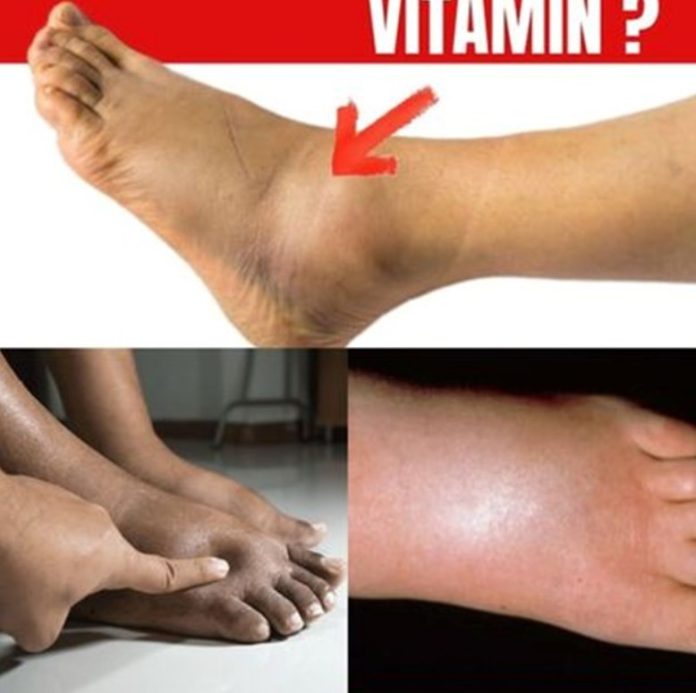Maintaining healthy legs and feet is essential for overall well-being, yet many people overlook the importance of proper nutrition in supporting circulation and nerve function in these areas. Poor circulation, nerve damage, and muscle cramps are common issues that can lead to discomfort and even long-term health problems.
However, by incorporating the right vitamins and minerals into your diet, you can significantly improve your leg and foot health, preventing or alleviating these common issues. In this guide, we’ll explore the number one vitamin for removing leg and foot pain and discuss how it works, how to incorporate it into your daily routine, and what other nutrients can complement its effects.
The Power of Vitamin B12: A Key Player in Leg and Foot Health
Vitamin B12, also known as cobalamin, is crucial for maintaining nerve health, producing red blood cells, and supporting DNA synthesis. A deficiency in this essential vitamin can lead to various health problems, including neurological issues that often manifest as pain, tingling, or numbness in the legs and feet. This is particularly true for individuals who are older, have digestive disorders, or follow a vegan or vegetarian diet, as B12 is primarily found in animal products.
One of the most common symptoms of a B12 deficiency is peripheral neuropathy, a condition where the nerves that carry signals to and from the brain and spinal cord to the rest of the body are damaged. This can result in sharp, stabbing pains, muscle weakness, and a feeling of pins and needles in the extremities, especially the legs and feet. By addressing a B12 deficiency, you can reduce or even eliminate these symptoms, leading to improved comfort and mobility.
How Vitamin B12 Works to Alleviate Pain
Vitamin B12 is essential for the production of myelin, the protective sheath that surrounds nerves and ensures the efficient transmission of nerve signals. Without adequate B12, myelin can deteriorate, leading to nerve damage and the painful symptoms associated with peripheral neuropathy. Supplementing with B12 helps to repair damaged nerves, restore myelin, and reduce inflammation, all of which contribute to the alleviation of leg and foot pain.
Moreover, B12 plays a critical role in the production of red blood cells, which are responsible for transporting oxygen throughout the body. Improved oxygenation of the blood helps to enhance circulation, ensuring that your legs and feet receive the nutrients and oxygen they need to function properly. This improved circulation can also reduce the likelihood of developing painful conditions like leg cramps and restless leg syndrome.
Sources of Vitamin B12
While vitamin B12 is predominantly found in animal products, there are several ways to ensure you’re getting enough of this vital nutrient, whether through diet or supplementation. Some of the best dietary sources of B12 include:
- Meat: Beef, pork, lamb, and poultry are all excellent sources of B12.
- Fish: Tuna, salmon, trout, and sardines are rich in B12, making them great options for those who enjoy seafood.
- Dairy products: Milk, cheese, and yogurt contain significant amounts of B12.
- Eggs: Although not as rich in B12 as meat or fish, eggs still provide a good amount of this essential vitamin.
- Fortified foods: Many plant-based products, such as cereals, plant-based milk, and nutritional yeast, are fortified with B12, making them suitable options for vegetarians and vegans.
For individuals who struggle to get enough B12 through their diet, supplements are available in various forms, including pills, sublingual tablets, and injections. It’s important to consult with a healthcare provider before starting any supplementation to determine the appropriate dosage and ensure it’s safe for your specific health needs.
Complementary Nutrients for Leg and Foot Health
While vitamin B12 is a powerful tool in alleviating leg and foot pain, it’s not the only nutrient that can support these areas of your body. Several other vitamins and minerals work in tandem with B12 to promote healthy nerves, improve circulation, and reduce inflammation. These include:
- Vitamin D: Essential for calcium absorption and bone health, vitamin D also plays a role in nerve function and muscle strength. A deficiency in vitamin D can lead to muscle pain and weakness, which can exacerbate leg and foot issues.
- Magnesium: Known for its muscle-relaxing properties, magnesium can help prevent and alleviate leg cramps. It’s also involved in nerve function and blood sugar regulation, both of which are important for overall leg and foot health.
- Folate (Vitamin B9): Like B12, folate is essential for red blood cell production and DNA synthesis. It works closely with B12 to ensure proper nerve function and prevent anemia, which can contribute to leg and foot pain.
- Vitamin E: This antioxidant vitamin helps improve circulation and protect cells from damage. It can also reduce inflammation, making it a valuable addition to your leg and foot health regimen.
Practical Tips for Incorporating These Nutrients Into Your Routine
Maintaining adequate levels of vitamin B12 and other complementary nutrients doesn’t have to be complicated. Here are some practical tips to help you incorporate these essential vitamins and minerals into your daily routine:
- Eat a balanced diet: Focus on consuming a variety of foods rich in B12, vitamin D, magnesium, folate, and vitamin E. Include plenty of fruits, vegetables, lean proteins, and whole grains in your meals.
- Consider supplements: If you have dietary restrictions or health conditions that make it difficult to get enough B12 and other nutrients from food alone, talk to your healthcare provider about supplementation. They can recommend the best form and dosage for your needs.
- Stay active: Regular exercise helps improve circulation, strengthen muscles, and reduce the risk of developing leg and foot problems. Aim for at least 30 minutes of moderate activity most days of the week.
- Practice good foot care: Keep your feet clean, dry, and moisturized to prevent infections and other issues. Wearing comfortable, supportive shoes can also reduce the strain on your legs and feet.
Conclusion :
Vitamin B12 is not just another nutrient; it’s a cornerstone for maintaining optimal leg and foot health, especially when it comes to preventing and alleviating pain associated with nerve damage. This essential vitamin supports the integrity of your nervous system, ensures proper circulation, and plays a crucial role in the production of red blood cells, all of which are vital for keeping your legs and feet in top condition. Without sufficient B12, you may find yourself struggling with discomfort, tingling, or even debilitating pain that can severely impact your quality of life.
However, it’s important to remember that B12 works best when paired with a comprehensive approach to health. Integrating other key nutrients like vitamin D, magnesium, folate, and vitamin E into your daily routine can further enhance the benefits of B12, offering a well-rounded defense against the common issues that plague the legs and feet. These nutrients work synergistically to strengthen muscles, protect nerve cells, improve circulation, and reduce inflammation, all of which contribute to overall leg and foot well-being.
Beyond nutrition, adopting a holistic lifestyle that includes regular physical activity, proper foot care, and mindful dietary choices can significantly boost your leg and foot health. Exercise promotes circulation and strengthens the muscles that support your legs and feet, while proper foot care prevents infections and other issues that can exacerbate pain. By taking a proactive approach and addressing these factors together, you’re not just managing symptoms but actively working to prevent them, ensuring that your legs and feet remain healthy and pain-free.
Incorporating these practices into your life is an investment in your long-term health. Whether you’re already experiencing discomfort or simply looking to prevent future issues, focusing on your vitamin intake and overall wellness can lead to lasting improvements. Don’t wait for the pain to dictate your daily activities—take control of your leg and foot health today. By making informed choices now, you can enjoy a life of mobility, comfort, and vitality, free from the limitations that leg and foot pain can impose. Your journey to better health starts with a simple commitment to nourish your body with the vitamins and care it needs.
Source of the picture : Barbara O’Neill Lectures










